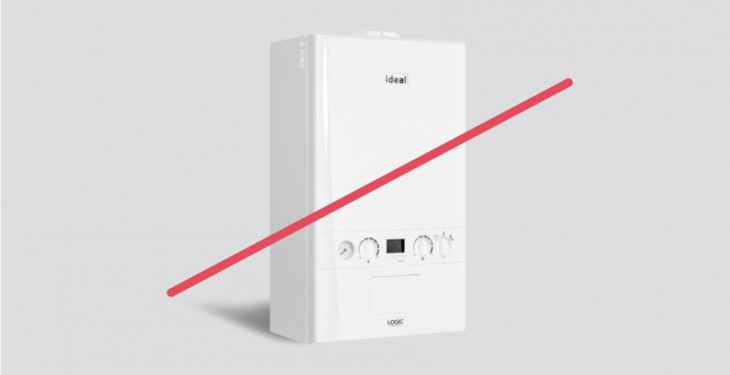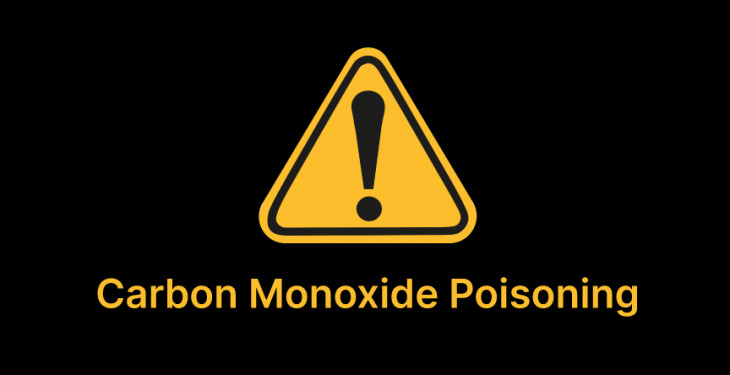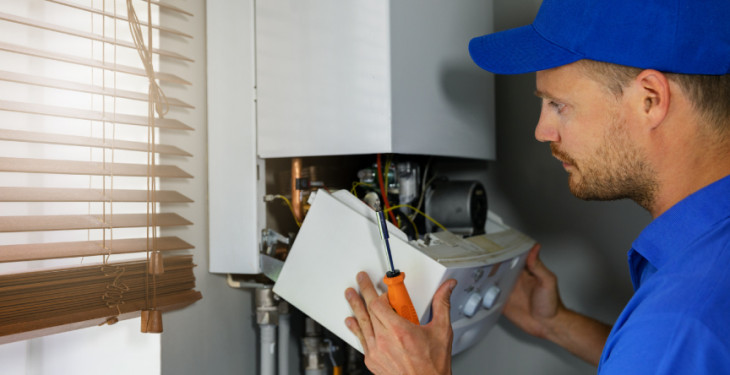

Written by Stephen Day
Gas Safe Engineer
Updated: 5th February, 2026
Lets explore the process of assessing and replacing an older, antiquated broken down appliance with a brand new top of the line boiler.
Get a new boiler quote, save up to £550 per year (0% APR available).
When a boiler stops working it can be a shock to the system, causing panic and stress for homeowners as an integral part of their property, that they rely upon for warmth, ceases to function.
Get a quote in 60 seconds, fitted as fast as next day!
0% APR finance available.
Any boiler issue is obviously important to get remedied as soon as possible, but in a triage system of urgency, some issues take precedence.
You can consider any of the following an emergency boiler matter:
Suspected gas leak (natural gas or carbon monoxide)
No heating or hot water during winter (especially important if you have children in the home)
Water is streaming out of a boiler or pipe at a very quick rate

Headaches
Dizziness
Nausea and vomiting
Tiredness and confusion
Stomach pain
Shortness of breath
Confusion
Irregular heartbeat
Seizures
Unfortunately, small gas leaks often do not have a smell or other physical signs, which means they can go undetected for a long time.
However, after a while you may notice signs such as a sulphur or rotten egg smell, hissing from a gas line, a damaged gas pipe or dead houseplants.
Or if you notice the small flame as seen through the viewing window on older boilers is yellow instead of blue, this could be a gas leak indicator.
Undetected gas leaks also pose the potentially lethal risk of gas ignition explosions, this is when a leaking gas source combines with the air and an ignition source (e.g lighter flame) to cause an explosive and violent combustion.
If you suspect your property has a gas leak it is crucial to carry out these steps:
Ensure all people and pets are evacuated from the house.
Leave doors and windows open.
Turn off the gas at the mains tap- this can usually be found near the gas meter.
Immediately call the National Gas Emergency Service number on 0800 111 999 as soon as you have evacuated the house.
Do not turn any power or light switches on or off.
Do not light any sort of flame within the property.
Do not use any appliances that could cause a spark.

Even in the event of a boiler issue not deemed an ‘emergency’, you can still contact an engineer for a call out if you believe it’s required, however the 24 hour rate will be down to that engineer or firm’s labour and expertise pricing but you can expect this will be around 30% above normal day rates.
Regular boiler companies will first have to send an engineer for an on site assessment, potentially allowing the situation to further deteriorate as time elapses, also it may prove prudent to contact and compare price quotes for any emergency boiler replacements.
Remember to fully document and authenticate prices before committing to any work being carried out to avoid disputes about the service costs down the line.
Sound like a lot to bear in mind while your boiler crumbles?
As a modern, online boiler installation company, iHeat will take away the burden of all of the above to make replacing your old broken boiler as easy as possible.
First of all, Instead of carrying out potentially disruptive and delaying location assessments, at iHeat we aim to make the quotation process as quick and efficient as possible.
After answering some simple multiple choice questions regarding your current home heating system, our iHeat quote software algorithm rapidly and accurately determines which boilers would be ideal for your property.
With our fixed price guarantee on quotes for any boiler installed, there's no need to worry about confusing cost changes or miscommunication, the iHeat process couldn't be any clearer.
All of our iHeat engineers are fully qualified and Gas Safe registered to boot, meaning only experienced professionals will be carrying out the work in your home.

Combi (combination) boilers link a home’s central heating system and water heating into a single unit, with all components integrated within the boiler.
The combi signals a sensor upon hot water demand, then takes water directly from the mains and the heat exchanger heats it for distribution to water outlets. This means there's no accompanying cylinder or hot water tank.
This allows a compact boiler which could fit into a standard kitchen cupboard or be wall mounted, to thoroughly heat a home without stealing lots of space. Combi systems are also easier to service or for boiler replacement due to their popularity, meaning greater availability.
Another great benefit of a combi boiler is its efficiency. By heating water on demand as opposed to constantly heating stored water, you can save energy and cut costs on your fuel bills. A new combi boiler should be around 90% efficient, so replacing your old boiler could save you up to £445 according to The Energy Saving Trust.
Age of Boiler | Efficiency Percentage | Efficiency Rating (ErP) |
0+ Years | 90% + | A |
10+ Years | 85% + | B/C |
15+ Years | 80% + | C/D |
20+ Years | 70% + | E/F |
25+ Years | 60% + | G |
The direct correlation between a boiler's age and its efficiency is clear to see in the newer systems’ ErP.
Selecting the right boiler brand is pivotal for ensuring efficiency, reliability, and longevity in home heating. Among the myriad of options, brands like Vaillant, Viessmann, Alpha, Ideal, and Worcester Bosch distinguish themselves with innovative technology and customer satisfaction. Below is an in-depth comparison of these brands, focusing on their standout models and unique industry positions.
Brand | Standout Model | Energy Efficiency | Unique Features | Environmental Impact |
Vaillant | ecoTEC Plus | A-rated | Eco-friendly, quiet operation | Reduced carbon emissions |
Viessmann | Vitodens 100-W | A-rated | Compact design, smart compatibility | Low emissions technology |
Alpha | E-Tec Plus | High efficiency | Compact, cost-effective | Energy-saving operation |
Ideal | Logic Plus | A-rated | User-friendly, easy installation | Efficient energy use |
Worcester Bosch | Greenstar i | A-rated | Robust build, smart controls | Eco-conscious design |
Vaillant's eco-friendly ethos shines in their ecoTEC range, particularly the ecoTEC Plus and ecoTEC Exclusive models. These boast top-tier energy efficiency and reduced carbon footprints. They're known for quiet operation and user-friendly controls, making them a harmonious blend of performance and environmental responsibility.
Viessmann's Vitodens series, especially the 100-W and 200-W, are hallmarks of high-efficiency and technology. These models feature compact designs and stainless steel Inox-Radial heat exchangers for durability. Advanced features like smart thermostat compatibility offer enhanced control and user convenience.
Alpha Heating Innovation's E-Tec range, particularly the E-Tec Plus, offers a fine balance between affordability and quality. Notable for their impressive energy efficiency and compact size, these boilers are suitable for various home types, making them an ideal choice for straightforward, efficient heating solutions.
Ideal Boilers, especially the Logic Plus range, are lauded for their reliability and value. These boilers stand out with their efficiency, user-friendly interface, and compactness, favoured for their ease of installation and maintenance. They come with comprehensive warranties, offering peace of mind and reliability.
A leader in the market, Worcester Bosch is synonymous with quality and reliability. The Greenstar range, including models like Greenstar i, Si, and CDi, is known for its efficiency and robust build quality. These boilers blend innovative features such as smart thermostat compatibility with user-friendly controls, making them a top choice in many homes.
Handy iHeat new boiler cost blog
Get a quote in 60 seconds, fitted as fast as next day! Need a new boiler?
0% APR finance available.
Last updated: 5th February, 2026

Written by Stephen Day
Gas Safe Engineer at iHeat
Stephen Day is a Gas Safe registered and FGAS certified engineer with over 20 years of hands-on experience in the heating, cooling, and renewable energy industry, specialising in boiler installations, air conditioning, and heat pump systems.
LinkedInArticles by Stephen Day are reviewed by iHeat’s technical team to ensure accuracy and reliability.

19th February, 2026
Selecting the appropriate boiler for your London home involves understanding the different...
 Read Article
Read Article

19th February, 2026
A typical Annual Boiler Service includes a visual inspection to identify any obvious fault...
 Read Article
Read Article

19th February, 2026
Boiler servicing comprises a set of inspections and tests conducted by a qualified enginee...
 Read Article
Read Article
No obligation. Takes less than 60 seconds.